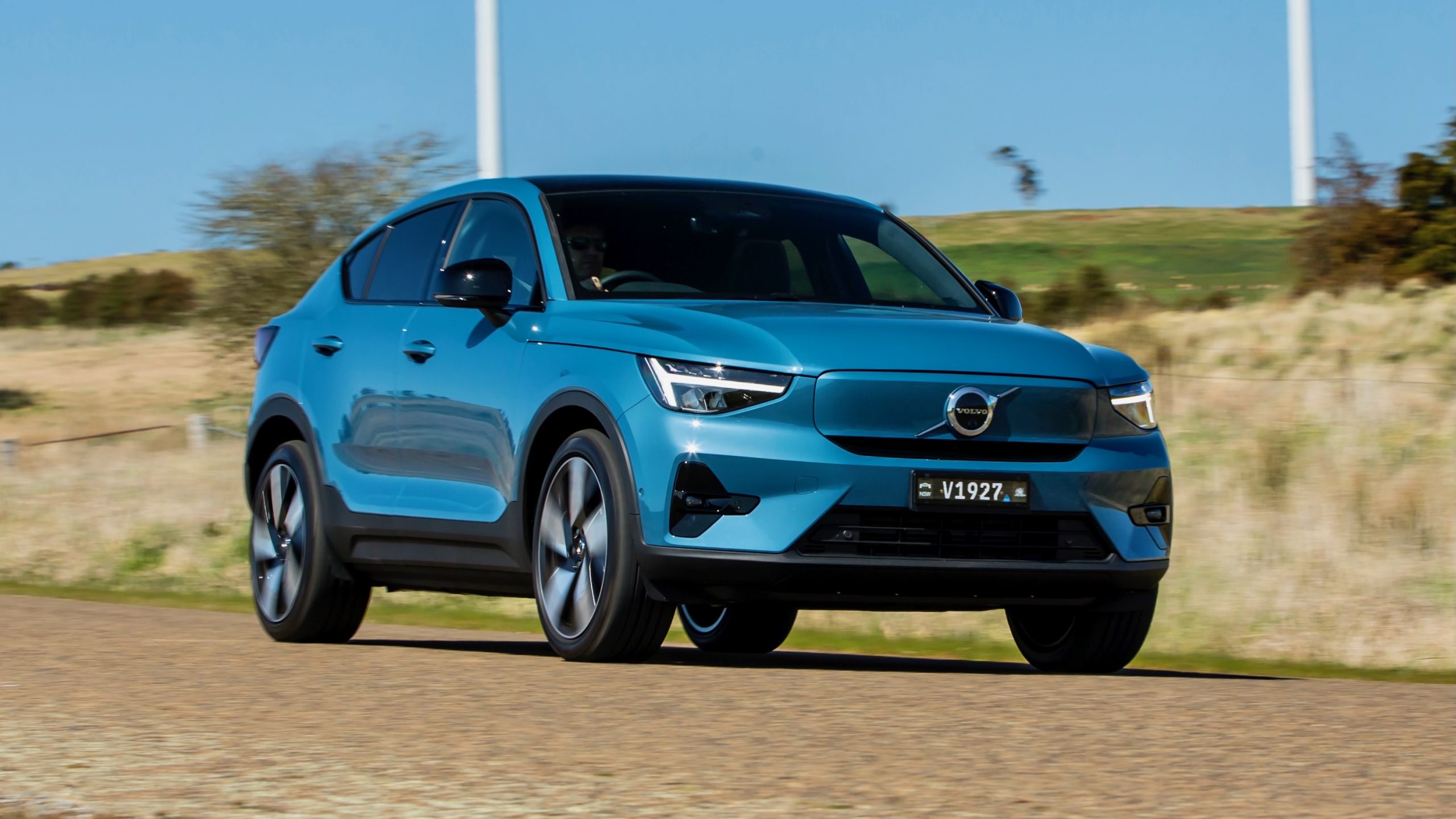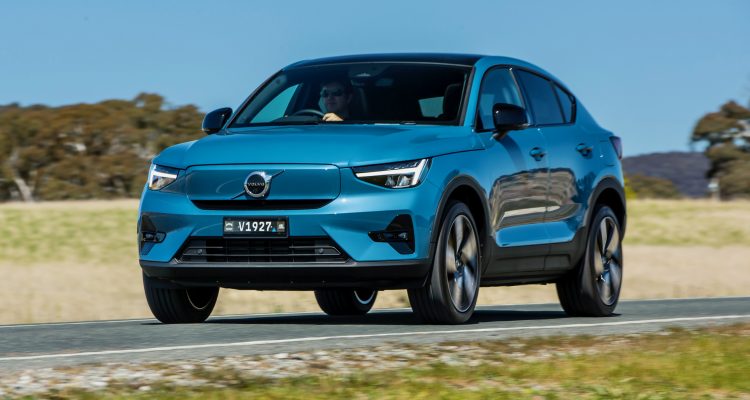- Takes XC40's base and adds some coupe style
- Excellent performance from the Twin Motor variant
- Loaded with standard equipment
- Thick pillars and no rear wiper hinder visibility
- No sunroof blind not ideal in Australian summers
- Umm...
Volvo’s transition to full-electric car maker continues to gain momentum. While there are still petrol-powered models in the lineup, the company has shelved diesel engines, made all its engines either mild- or plug-in hybrids and has a new fully-electric EX90 on the way. For now though, the next step in the Volvo electrification journey is this: the 2023 Volvo C40 Recharge Pure Electric. What’s it like? Let’s find out.

What’s a C40, we hear you ask? Well, take the excellent XC40 Recharge Pure Electric and add a stylish coupe-looking bodystyle and $3,000 to the price and you have the C40. But is there more to the C40 – does it have more character and should you be considering it over other electric SUVs? We attended the local press launch in Adelaide, South Australia to find out.
For now, there are two C40 models in Australia: the entry-level Single Motor (from $74,990 plus on-road costs or around $77,000 drive away) and the top-spec Twin Motor (from $82,490 +ORC or around $89,000 drive away).




The entry-level Single Motor features all-LED lighting, auto lights and wipers, 19-inch alloy wheels, dual-zone climate control, textile upholstery, electrically adjustable front seats with driver’s memory, heated front and rear seats, a heated steering wheel, a panoramic glass roof, keyless entry and start, a 9.0-inch touchscreen with Android Automotive software with an inbuilt SIM card with four years’ included data, Google Maps satellite navigation, digital radio, Apple CarPlay, wireless phone charging, four USB-C charging ports, LED ambient interior lighting, an electric tailgate and a 12.3-inch digital driver’s display.
Safety kit includes seven airbags, auto emergency braking (AEB) with pedestrian and cyclist detection, adaptive cruise control with stop and functionality, reverse auto braking, lane keep assist with lane trace assist, blind-spot monitoring with rear cross-traffic alert, front and rear parking sensors, a reversing camera, driver attention monitoring, speed sign recognition and auto-dimming mirrors.




The upper-spec all-wheel drive Twin Motor further adds larger 20-inch wheels, a 360-degree parking camera, automatic parking functionality, a 13-speaker Harmon Kardon sound system, extra interior ambient lighting, a PM2.5 air filter, power-folding rear headrests and ‘Microtech’ vinyl and textile upholstery.
No colour costs extra money on the C40 and the available options are ‘Black Stone’, ‘Onyx Black’, ‘Fusion Red’, ‘Thunder Grey’, ‘Fjord Blue’, ‘Silver Dawn’, ‘Crystal White’ and ‘Sage Green’. Charcoal black is the sole interior colour option.

There are a number of sub-$90,000 electric SUV competitors to the C40: the Kia EV6 (from $72,590 plus on-road costs), the Hyundai Ioniq 5 (from $72,000+ORC), the Tesla Model Y (from $72,300+ORC), the Mercedes-Benz EQA (from $78,513 +ORC), the incoming BMW iX1 (from $72,300 +ORC) and of course, the XC40 Recharge (from $71,990 +ORC).
Using the same ‘Compact Modular Architecture’ as the XC40 and the Polestar 2, the 2023 Volvo C40 uses a lithium-ion battery pack in either 69kWh (P6) or 78kWh (P8) sizes. The Single Motor uses a 170kW/330Nm electric motor that solely drives the front wheels – the Twin Motor adds a rear motor for a total of 300kW/660Nm. The claimed 0-100km/h sprint time for the Single Motor is 7.4 seconds – the Twin Motor completes the same sprint in just 4.7 seconds – while the former’s claimed WLTP range is 434km, which is 14km more than the latter’s 420km rating.

Charging the C40 Single Motor from 10 to 80 per cent can be done in as little as 32 minutes using a 150kW DC fast charger – the larger battery of the Twin Motor increases this slightly to 40 minutes. AC charging can be done at up to 11kW, with a full charge in up to around eight hours. By comparison, the 168kW/350Nm Kia EV6 Air can travel up to 528km on a charge from its 77.4kWh battery pack, hit 100km/h in 7.3 seconds and can be charged at up to 350kW for a 0 to 80 per cent charge in just 18 minutes.
We took a steer of the C40 Recharge P8 initially and came away very impressed – unsurprisingly, C40 feels pretty much like an XC40 to drive. At higher speeds it feels very solid and sure footed on the road. The Twin Motor’s drivetrain really takes you by surprise when the full 300kW of power kicks in, especially with how quiet and comfortable the C40 is otherwise. It’s a fun car to drive, and feels lighter on its feet than its 2,154kg tare mass would suggest.

Like in the XC40, the C40’s one-pedal driving was quote intuitive and very easy to gauge – much more so than in other applications we have tested. We found it very easy to get used to and found we very rarely needed to intervene and use the brakes, which makes it easier to drive.
The handling ability of the C40 Recharge is excellent in our opinion – while some EVs can feel a little wallowy around corners, the C40 hugs the road excellently and displays very little body roll. Despite the huge 20-inch wheels of the P8, the ride is very composed. It is slightly on the firmer side but the trade off is excellent body control. Like the XC40, the road manners of the C40 are very mature.

The interior of the 2023 Volvo C40 is almost identical to the XC40, save for some trim differences and – obviously – the sloped roofline. The quality of the materials is similarly great with lots of soft touch plastics all over the cabin, plus lovely textile and vinyl seat upholstery, while it’s also quite practical with big flock-lined door bins, a large centre tray with a wireless phone charger, a big centre box with an inbuilt bin and a big glovebox as well.
The 9.0-inch touchscreen in the centre of the C40’s cabin uses the Android Automotive system and includes Google Services like Google Assistance with Google Maps as standard. Its data is free for the first four years of ownership – a data plan will be after that – while Apple CarPlay is also included, as are apps like Spotify and digital radio. Over-the-air updates keep the system at its newest – provided you’re in reception, that is.

The rear seat of the C40 is roomy, despite the sloping roofline. There’s ample legroom available, while headroom isn’t as plentiful as its boxier sibling, it’s still reasonable. The rear seat is also well featured with door and seat pockets, a centre armrest with cup holders, two USB-C charging ports, air vents and heated outboard seats.
The boot of the C40 measures 489-litres, with 1,205L available with the rear seats folded – 93L and 123L less respectively than the XC40. The boot floor itself can fold up to create a divider, while there are also some hooks and side storage, though no spare wheel. There’s also a front boot, which is large enough for a few shopping bags and the car’s charge cable.

One thing that the C40 lacks is rear visibility, due to the sloping roofline and thick C-pillars, we found it harder to see out the back than you would in the XC40. It also has no rear wiper, which is very annoying.
For service and warranty, Volvo Cars Australia gives its new cars a five-year/unlimited km warranty with eight years of roadside assistance, and the C40’s service intervals are once every two years or every 30,000km. Three years/100,000km of servicing is included.
The 2023 Volvo C40 Recharge Pure Electric DiscoverAuto Rating: 8/10
Overall, this first taste of the 2023 Volvo C40 has us quite impressed with Volvo’s newest product. Of course, injecting some coupe style to the lovely XC40 is obviously going to be a great product, but the C40 manages to do that and display its own unique character to the XC40.
It’s a great all-rounder – it’s relatively good value for money, loaded with equipment, it drives well, features stonking performance (as the Twin Motor) and for those wanting it, it’s handsome as well.

Of course, it isn’t perfect – its range isn’t amazing, there’s no sunshade for the standard glass roof and the sloping roofline eats into rear headroom a bit and worsens visibility – but overall, we think the 2023 Volvo C40 is a great addition to the local Volvo stable. If Volvo’s continued transition to electrification is as positive, bring it on we say.

Leave a Reply